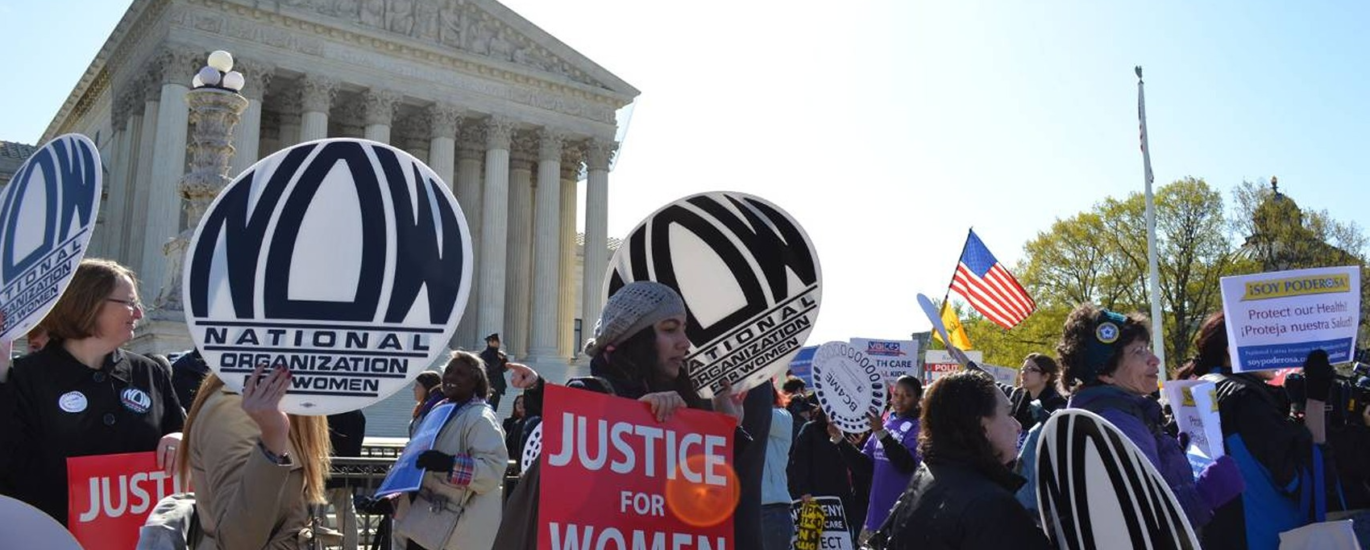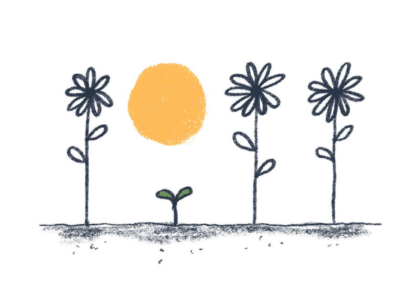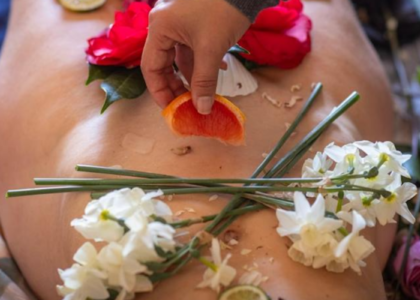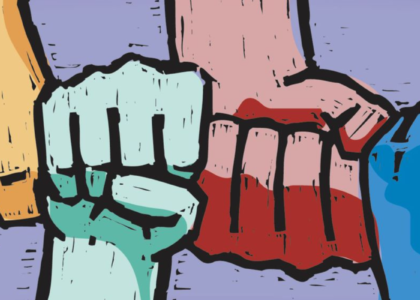“women have to bring their own chair to the table”
Amy is joined by Christian Nunes, current President of the National Organization for Women for a discussion of NOW’s history, overlooked feminist heroes, plus the fight for the Equal Rights Amendment and how to get involved in the largest feminist organization in America today.
Our Guest
Christian Nunes
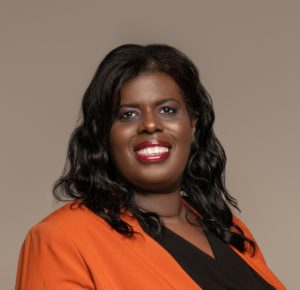
Christian F. Nunes, MBA, MS, LCSW, became the National Organization for Women’s President in August 2020. She was previously appointed Vice President by the board in May 2019. As the second African American president in the organization’s history, the youngest person of color, and the youngest president in more than 40 years, Nunes is leading the organization through an intersectional lens, bringing a diverse coalition of grassroots activists to work against structural sexism and racism.
Christian is a former NOW board member and committee chair, as well as a licensed clinical social worker, consultant, and woman-minority business owner. She is an active community organizer and public speaker, regularly featured at events such as the March for Black Women, Women’s March Events, and rallies around the country in support of the Equal Rights Amendment and immigration rights. Along with her activism for mental health, Christian has more than 20 years of experience advocating for children’s and women’s issues.
The Discussion
Amy Allebest: I recently asked a bunch of women to tell me what they knew about the National Organization for Women, or NOW, and I was so thrilled that most women had heard of it. The most common response I got was, “Wasn’t that Gloria Steinem’s group?” Some people, probably those who had watched the 2020 miniseries Mrs. America, knew that it had actually been founded by Betty Friedan, who was the author of The Feminine Mystique. According to second wave feminism lore, in 1966 a group of women gathered in Friedan’s hotel room at a conference, and she wrote the acronym N.O.W. on a paper napkin. But is that origin story true? Is it complete? What did NOW do then, and what does it do now? To answer these questions, I am so excited to welcome to the podcast the current president of NOW, Christian Nunes. Thanks for being here, Christian. I am so, so honored to have you here!
Christian Nunes: Thank you so much. I’m so excited to be on the podcast to speak with you in conversation.
AA: We usually start our episodes with a bio of our guest, so I’ll read your formal introduction first, and then I’ll have you introduce yourself a little more informally afterwards, if that sounds good. Christian F. Nunes, MBA, MS, LCSW, became NOW president in August 2020. She was previously appointed vice president by the board in May 2019. As the second African American president in the organization’s history, the youngest person of color, and the youngest president in more than 40 years, Nunes is leading the organization through an intersectional lens, bringing a diverse coalition of grassroots activists to work against structural sexism and racism.
Christian is a former NOW board member and committee chair, as well as a licensed clinical social worker, consultant, and woman minority business owner. She’s an active community organizer and public speaker, regularly featured at events such as the March for Black Women, Women’s March events, and rallies across the country in support of the Equal Rights Amendment and immigration rights. Along with her activism for mental health, Christian has more than 20 years of experience advocating for children’s and women’s issues. And I have to say that was the abbreviated version of the bio, so I know there is more that we could go into! I’d love it if you would start us from the beginning, where you’re from, and a little bit about your family of origin and what brought you to do the work that you do today.
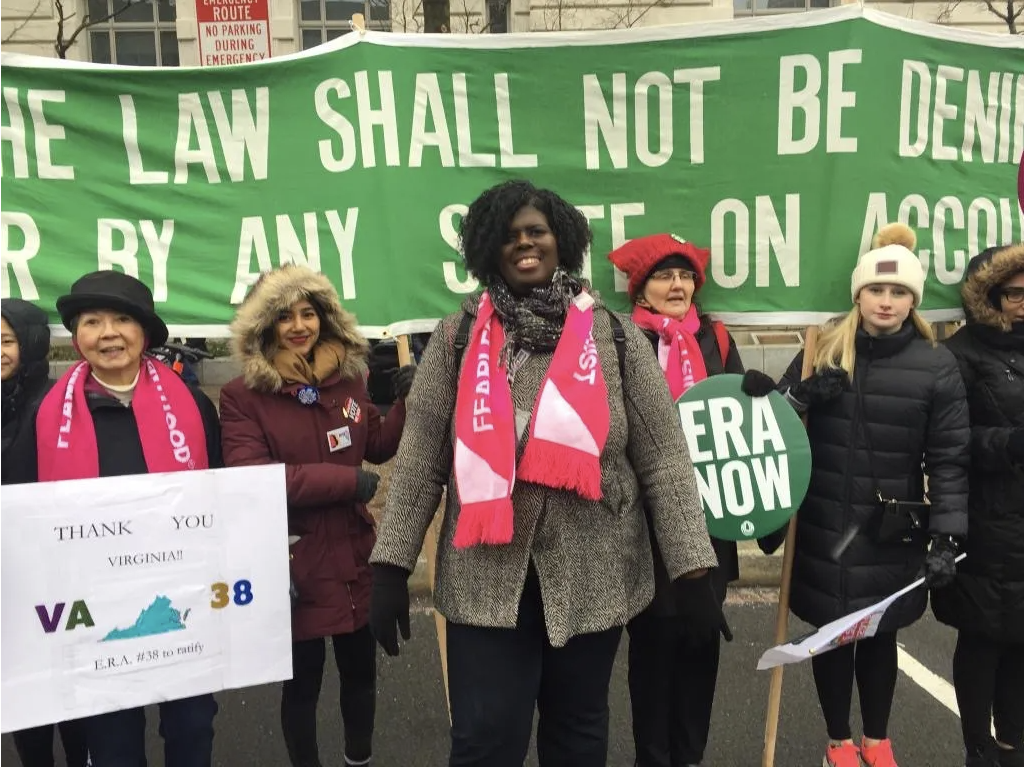
CN: Sure. I’m originally from Houston, Texas, and I grew up there half of my life before my mother and my brothers and I relocated to Arizona when I was in seventh grade. And it was quite a different change. You can imagine the culture shock for what I was used to. We moved out to Phoenix, Arizona when I was in seventh grade and from there, I pretty much grew up most of my life in Phoenix, Arizona. I went to undergrad at NAU, Northern Arizona University, and then I took a year off and worked and I immediately started in social work. I’ve always really wanted to help people and be involved in justice work and community organizing work. So my background has always been social work. I would say, actually, when I was young I wanted to be a lawyer since I was age nine, and so I thought about it, but I think I was more passionate about working directly with people. I somehow got involved in social work and I took a year off from work to be a domestic violence advocate, a victim advocate for victims of crime, before I deferred my admission to grad school.
Afterward I went to grad school, and then moved out to New York City and went to Columbia University and got my Master of Science degree in social work from Columbia University and focused in clinical practice with health, mental health, and disabilities. So that’s really where I shift my career. And I always did that work because I felt like it was important for you to be a face in the community for someone that can relate to you and be able to truly have somebody that can understand your perspective. So I did that and also maintained community organizing. I did that on the side. So it’s kind of interesting, I worked at my job as a therapist and then I did community organizing as my own personal commitment to the community. And then I got involved in political organizing at the same time.
But when I was in grad school, I first got introduced to NOW in a CANs chapter, and it kind of led me to stay in the organization through being involved in community chapters. And eventually, it was really interesting, Amy, I never thought I’d be president of NOW, of National NOW. It’s interesting how your life unfolds, but I eventually went from a local chapter to state chapter leadership to national board. And then being appointed to vice president and then all of a sudden becoming a candidate. And like I said, my background is in mental health and health policy and so I never really saw that in the trajectory of my career. But I knew that women’s rights and children’s rights was always something I really dedicated myself to. So I think it’s interesting because it all connects, and really truthfully, I’m still doing advocacy work. I’m still doing women’s and children’s rights work, it’s just on a different side of it.
AA: That’s so interesting and so inspiring. We did an episode earlier this season on a book called Women in Politics by Mary Chung Hayashi, and she talks about how most people don’t envision themselves in those roles. Actually, people who do, you might not want them in those roles, right? I mean, you can tell with certain politicians that it’s about them and their ego more than about community service. But her book was so inspiring to me because she’s like, listen, it’s scary to everybody, but you just start with asking, what am I passionate about? And then don’t be scared to run for office. Don’t be scared to do those bigger things because everybody feels intimidated by it a little bit. But we need people to do it. And her whole thing was that sometimes women are more intimidated by those roles. And she’s just like, just do it. You can do it. And so anytime I hear these stories it really inspires me, and I think it inspires listeners to see someone who’s like, “I don’t know, I didn’t envision myself as president, but I just kept working and kept learning, and here I am.”
CN: Yeah. And I will tell you, Amy, it’s really interesting stuff. I have an MBA degree, so I have two masters, but I will say that those combination of skills I think have helped me tremendously in this role. Because not only do I know firsthand what people go through, I’ve worked with clients and I’ve seen it directly when you’re working in the field. I’ve seen it directly when clients couldn’t pay their bills. I’ve seen it directly when women were going through the system and sitting at a bedside by someone who just experienced rape. Or someone’s child who just experienced being abused. Or someone who just got evicted from their home. The one who couldn’t pay their bills and had to choose childcare.
So, living those experiences and working with clients directly, I know exactly what the disconnects are in services and policy. And now being in a position where I’m doing advocacy work, knowing what legislation needs to do. So it’s very interesting how the connection of those two things and also having a business degree and knowing how to run that side of the organization, I think have really suited me very well for leading the organization because I can see things sometimes other people cannot see because I have worked directly with people. So, even though I didn’t envision it, I think it’s interesting how it comes full circle. And that training, that background, that work has really helped me stay empathetic, but also stay connected to people.
AA: Yeah, that’s amazing. I can totally see how all of your experience and your hard work prepared you so that you are completely qualified. And the MBA, maybe that’s a piece that for me, I do feel intimidated by administration roles, being in charge and organizing committees and organizing meetings and stuff. Because I’m a teacher and I’m a connector more one-on-one, those things intimidate me. But I’m guessing that that’s what an MBA is in a lot of ways. I mean, you learn the math and the finance side, my husband has an MBA, but you learn to be in charge of groups of people. It seems like you did cover all your bases and you’re totally ready.
CN: Teachers are the best business administrators. How you manage the classroom, I mean, listen, that’s the best business administration in the world. I’ll tell you.
AA: Oh, that’s funny. Well, fabulous. This is so great. And congratulations. I’m really, really excited to hear more about NOW and about the direction that you’ve taken it in. I wonder if we can start at the beginning and revisit that origin story that I hinted at at the beginning, because I know there has to be so much more to that story. I do happen to know just a tiny bit more because I’ve studied second wave feminism, so I do know a couple more of the names, but I’m not going to steal your thunder. I’m just going to have you tell us the story. So, can you tell us a little bit about the founding of NOW and some of the other people that were involved in addition to Betty Friedan?
Living those experiences and working with clients directly, I know exactly what the disconnects are in services and policy
CN: Sure. What people know about NOW is they hear the story about Betty Friedan, who’s famous for The Feminine Mystique, as the main founder of NOW. But what they don’t know is that there were over 28 co-founders of NOW. And she was the main person who was the thought leader, the mind behind founding the organization, but one of the other main women behind founding NOW, whom Betty turns to to talk through founding the organization, was Reverend Dr. Pauli Murray. And a year before they had that meeting in the hotel room, and when you hear about the paper napkin, which is very true, she actually reached out and had a conversation with Reverend Dr. Pauli Murray about this concept. And it was really started on the idea that women needed a place that was their own. An organization that really was a place for them that was similar to the NAACP but addressed the intersections of racism and sexism. And which addressed this discrimination that they were facing, and it kind of wrapped around the idea about the “Help Wanted” ads being that they were segregated, so there were ads for women and ads for men. So this was impetus enough for them to decide to start this organization, and they were seeing that there was too much gender discrimination in employment and jobs and they needed this to stop. So this is what started them on their journey for this organization, recognizing that women were not treated equally.
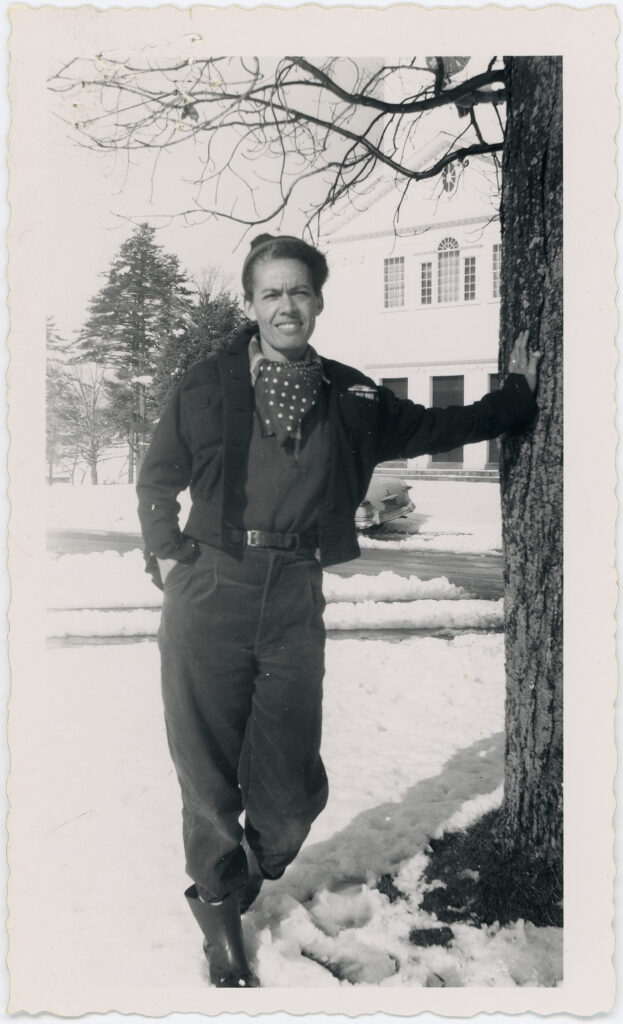
So they got together, and this was a very diverse group of co-founders. There were some men co-founders that were involved as well. But it was a very mixed group, a very diverse group, and probably a very intersectional group as well, of Black women, white women, and Black and white men who came together and started this group. And they decided to sit down and come up with what they wanted to see for this organization, what they want this organization to stand for. And they started with some principles like equality, ending discrimination, ending racism, ending gender pay disparity, increasing equality at all levels. Equal rights have been a big part of it. And they came together and really formatted out what they wanted, and a statement of purpose was written and drafted. And that’s really what formatted the beginning of the National Organization for Women. And from there, it just blossomed and became, and still to this day, it’s the largest and oldest grassroots organization that’s focused on intersectional grassroots movements from a multi-strategy, multi-systemic approach to the work that we do.
AA: I just had something occur to me that I’d never really thought of before. I know that Betty Friedan, for all the good things she did, and she did do so many good things, she had some homophobic prejudice and really resisted what she called the “lavender menace” of lesbian women in the movement. And knowing that Pauli Murray was queer but that they were friends, do you know about any tensions between straight women and queer women?
CN: What I do know about the feminist movement is there were periods in time where, and I think this happened in NOW since it was the first and largest organization, they made mistakes. They made mistakes by not fully allowing women to be authentic in themselves and to be recognized in themselves. This includes Black women. Even though Pauli Murray was a co-founder, and also Eileen Hernandez was a Black woman, she was a co-founder when she was the first Black president in NOW. These women still did not feel like they fully were able to feel safe in the organization, or able to really feel recognized for the issues that that brought to tension for them. And this is very common, we hear this today in a lot of organizations for women of color, not just Black women. We hear this about women who are LGBTQIA, we hear about marginalized community women, disabled women, Asian women, Latine women and indigenous women. We hear that sometimes in organizations they do not feel safe and they don’t feel like the environment is created for them to fully live their full potential and be recognized. So I think there’s always work to be done in this space. And I think that even with NOW, and other organizations during the feminist movement, there are periods in time when this happened and NOW is no exception to that. And if we’re being honest about it, there are so many wonderful things we did but there’s also mistakes that we made, and part of our job is to be able to own our mistakes so that we can improve on them.
AA: Yeah, that’s great. That’s a great perspective. I’m thinking of Shirley Chisholm, too. Was she one of the co-founders or was she there at the founding? I know she was involved somehow.
CN: Yeah, she wasn’t a co-founder but she was an original member. So she was there at the very beginning.
AA: Do you want to talk about Shirley Chisholm at all for any listeners who haven’t heard of her? She’s a big deal.
CN: Oh my goodness, Shirley Chisholm is amazing. Another amazing leader, feminist, activist, and civil rights shaker. And also another unspun shero who, although she was the first Black woman to run for president, a civil rights activist, demanded to be recognized for her worth at a time when there was so much racism and sexism happening. But what I love about Shirley Chisholm is that she demanded respect when a lot of times that wasn’t given to women, and it definitely wasn’t given to Black women. And she spoke out. She wrote so many bills when she was in Congress, and she contributed so much important legislation. We’re so honored to have her part of our history.
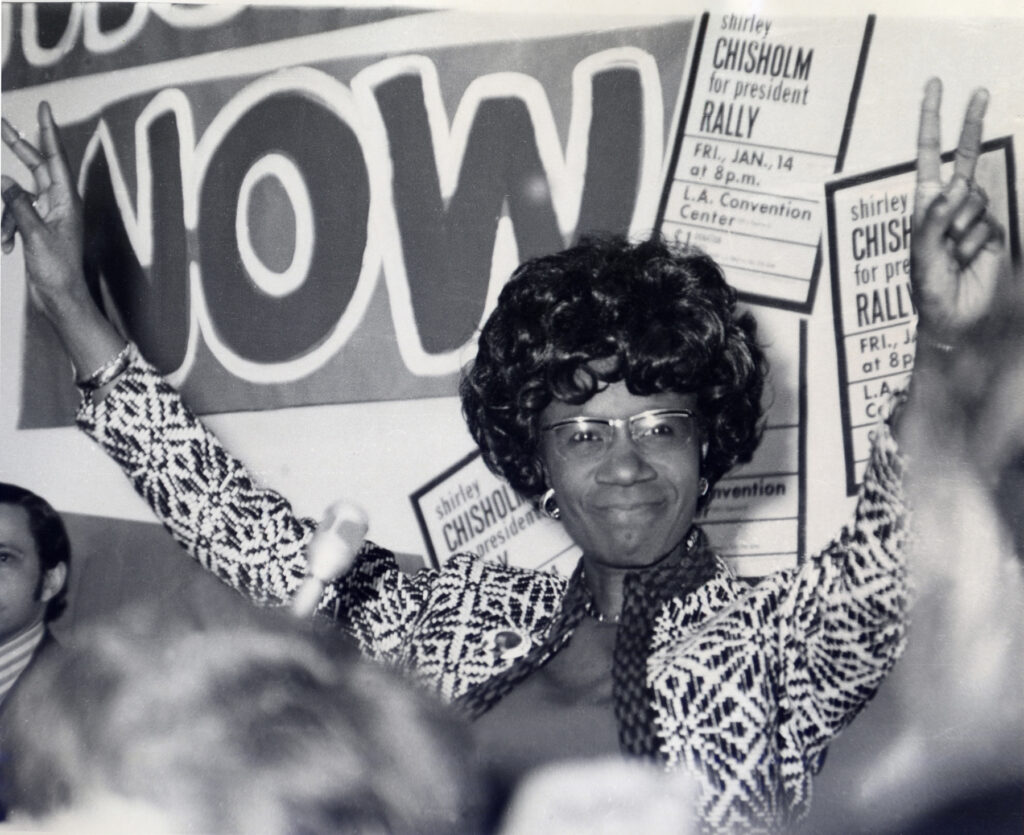
One of the great things I will say, one of the things I’m very proud of NOW for is that NOW is the organization that endorsed almost every single Black woman that started their journey in the congressional race, and Congresswomen in general. I mean, most women running for office had their first endorsement by NOW, most Black women running for office had their first endorsement by NOW. So that is something that I’m very proud of. We recognized early on how important it was to be in that space, to stand up and stand out for a lot of women who needed to be recognized. And no, not every one of them did we endorse, but some of them, and that is very important. We still try to make sure to this day that we are recognized as uplifting feminist heroes and sheroes that are really doing the work of the feminist agenda. But yeah, she’s amazing. We hear that famous quote of hers, “If they don’t give you a seat at the table, bring a folding chair.” That’s very famous, we hear it constantly. But it’s so important because a lot of times, even today, women have to bring their own chair to the table. And representation matters, so she continues to teach us that. And we use those words every day.
AA: Wonderful. Well, speaking of the concept that representation matters, that reminds me that I wanted to circle back to Pauli Murray because Pauli Murray is having a big moment of recognition and representation soon, right? Can you tell us about that?
CN: Yes, this is so amazing. And thank you to the congressional members who helped create the U.S. women leaders coin campaign. The U.S. Mint has come out with a quarters campaign where they are releasing quarters after U.S. women who are leaders, they are activists, they are amazing leaders in history, and the majority of them are women who normally wouldn’t get recognized for their contributions to this world. One of those women is our amazing co-founder, the Reverend Dr. Pauli Murray, for her contributions to women’s rights, to feminist rights, to civil rights. The contributions she’s made, not only domestically, but internationally, are amazing. And we’re so excited to honor her on this coin and have this quarter come out. It will be released on February 22nd. Just to name some events that will be happening, if anyone wants to attend, the Women’s National Museum with the U.S. Mint is holding a discussion at the Martin Luther King Library in D.C. to honor and celebrate her achievements and her legacy. We’re having a panel and a celebration on the 22nd of February, and you can go to the U.S. Mint website to find out about this event. It’s open to the public and free, so that will be a great event. And as well, we are holding an event on the 28th to also give honor to her. It’s really important to give her the flowers that she didn’t receive when she was alive.
AA: Yeah, I was going to say it’s about time. I didn’t discover Pauli Murray, I’d never heard of her until a few years ago, and there was an article in The Atlantic called “The Many Lives of Pauli Murray”. And I was stunned, my jaw dropped paragraph after paragraph of things that she accomplished, but she was always just slightly behind the scenes, so the big deal things that happened were like her brainchild, but she never really got credit for it. But she broke so many barriers. I was kind of furious that I had never heard of her and that nobody really knew who she was. So hopefully now that she’s on money, she’ll literally have more visibility for Americans to know who she was.
CN: Yeah. And Amy, I’d be remiss if I didn’t say this, but unfortunately, this is very common for women of color, especially Black women. That they are the ones that are doing such amazing work and a lot of time behind the scenes, but are often not given credit for their contributions to shifting and changing this world. Even democracy, helping save our democracy, helping set this world, and we don’t hear about them. In the civil rights movement we don’t hear about them, in the women’s movement we don’t hear about them, in the right to vote we don’t hear about them. And people say, “Why didn’t I hear about them?” This is an intentional act that’s happened in our history, and we don’t want to claim it. We don’t want to own it, but we have to own it now. We have to come back and take accountability for the fact that we intentionally left these women out when we knew that they were behind such incredible, brilliant work that really helped this world and helped the United States of America.
Reverend Dr. Pauli Murray helped write the constitution of Ghana. She was akin to Eleanor Roosevelt. They relied on her. Ruth Bader Ginsburg gave her citation and quote in her work. I mean, this is just an amazing woman who was cited on so many different things. She was right there with Martin Luther King and Rustin and so many of these great civil rights activists, but she’s been here. A lot of women were right there that we don’t hear about. So I think we have to start really taking the time and start saying their names, calling them out, recognizing what they’ve done. Making sure when we’re speaking about these movements, we also say, “And by the way, did you hear about the work of this person as well? Did you hear about how they contributed to this?” And by having this podcast and saying, “Did you know about Reverend Pauli Murray?” This is practically how you break down patriarchy. Exactly.
we intentionally left these women out when we knew that they were behind such incredible, brilliant work
AA: That’s the goal. That’s the goal, Christian! Are there any other unsung sheroes that you want to tell us about?
CN: Sure. One other important person in NOW’s history that I really want to give flowers to, who I think is really important, is Loretta Ross. Loretta Ross was hired in the mid-1980s to come into NOW to help improve the relations with NOW and women of color. To make sure that we were extending and hearing the voices of women of color and building race relations and racial justice in the organization and doing that work. So this is really important, I think, in the ‘80s to make sure that NOW was living to its racial justice core issue. So by her coming into the organization and making sure that the voices of women of color are being heard and women who are marginalized are being heard, was such a critical time early in the 1985-1990 time period. Many organizations didn’t care. So I’m proud of NOW for recognizing the importance of that and bringing her in to say that we’re going to make sure we’re recognizing our members and listening to them. But also taking the time to bring someone in and letting her do it her way and her committing to doing this work. So I want to make sure we recognize her for being a part of the staff who came in. And Loretta Ross, I don’t know if you know her, she’s an amazing activist and feminist as well. She also went on and started other organizations like SisterSong, she’s really famous for reproductive rights and justice work. She’s fabulous as well. She’s known for calling in, not calling out. But I want to give her some flowers as well. I think she did amazing things for NOW. There’s other women as well, but I really appreciate the work she’s done with reproductive justice as well as the work she’s done in NOW.
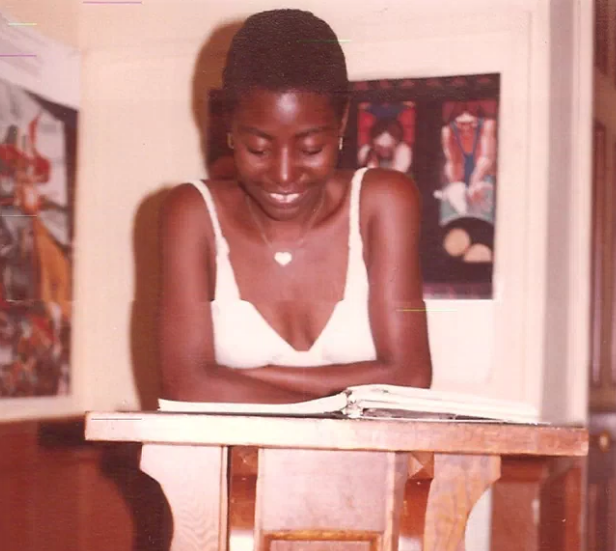
AA: Wonderful. I’d never heard of her, so thank you for bringing her to my attention. And now all of our listeners will benefit from that. We’ll have to go in and look her up after we finish with this episode. Thank you so much. That leads me to another question that I have. Thinking about NOW in the ‘80s, because like I said, most people if they’ve heard of NOW, which a lot of people have and I’m so happy about, they maybe think of its origins and the second wave of feminism in the ‘60s and ‘70s. And then maybe they hear what NOW is doing currently, but I just realized, as you talked about the ‘80s, that there would have been totally different needs, different initiatives that happened all along the way. Could you talk about some of the initiatives that NOW was a part of? The kind of the work that they’ve done specifically and then take us through to the present day and tell us about some of your current work that you’re doing there.
CN: Sure. To give a background, NOW has six core issues that we work on. It is reproductive rights and justice, the Equal Rights Amendment, constitutional equality, economic justice, LGBTQIA rights, racial justice, and ending violence against women. And so when we’re looking at all these different issues that we’re working on, like I said earlier, is multi-strategic and multi-systemic, the way we work at things. So we don’t look at things in single issues. We look at them from how they intersect and how they approach different women and the different levels of power impact different women within these systems. So we can’t just say reproductive justice is only about reproductive freedom, we have to look at how economic injustice impacts women, as well as violence, and how racial justice impacts reproductive justice. All those things come into play.
We have continuously worked on those issues throughout our 57, almost 58 years of existence. A lot of work has been done around Title IX. A lot of work has been done around the wage gap. A lot of work has been done around sexual harassment and ending violence against women, in VAWA. A lot of work has been done around eliminating employment discrimination, eliminating racial discrimination we’ve seen in work and in school and education, any type of sex discrimination we’re seeing anywhere. We see work fighting against injustices with LGBTQIA, disability, housing, all those different things. The work has crossed over continuously. So anything that’s fighting against the equality of women as a whole is where we have done our work. NOW has been crucial in many cases, fighting against many cases, many lawsuits, and been involved in most of the major civil rights lawsuits from when we first started in the ‘60s. So I would say that we really, I mean, I don’t think there was a time when NOW hasn’t been involved or signed on as a part of any major legislation. Or even been involved in any lawsuit that wasn’t about making a huge shift or change. I don’t know if I would say that there’s anything really, I guess the biggest ones we know for sure are the Equal Rights Amendment, that’s huge. We’re still fighting for that. We’re still involved in that. Title IX is a big one that we’re still really involved in. VAWA, we were super involved in VAWA.
AA: Tell me what that is. I don’t know that acronym.
CN: Oh, I’m sorry. Violence Against Women.
AA: Oh, yeah.
CN: The Violence Against Women Act. That was huge. And we are continuing to be involved from the act to the reauthorization. We have been instrumental in that happening from the get-go and fighting for that from the get-go. We have literally been involved in every type of sex discrimination, the type of lawsuit, non-disclosure agreements, #MeToo movements, #enough campaigns, we have been involved in all these different things. If there has been anything where a woman has faced discrimination or violence… I guess I could go on. If you want to know more big cases, let me tell you some of our major ones that are super, super important.
AA: I’d love it.
CN: So we began with the EEOC public hearings for, we’re really encouraging against sex discrimination, like I said, this is regarding “Help Wanted” ads. That’s where we started in our history. That’s what I was really talking about, that they had the men’s “Help Wanted” and the female “Help Wanted” ads. We have been involved in the ERA, the Equal Rights Amendment, to get sex equality in the Constitution since the very beginning. And since we were founded in 1967, we very much started that, and it has been brought up in every single thing we’ve done. I would say every single year we’ve had campaigns for that consistently.
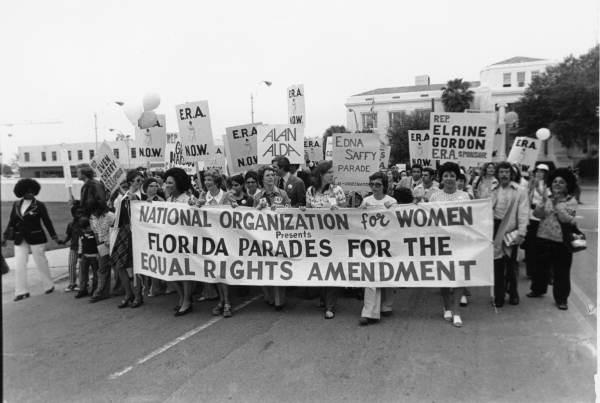
AA: Can I ask you to dig in a little bit more on that? I live in Utah, which is one of the states that is holding it up, that has not passed the ERA. I come from an LDS background and I’m well aware that my church was one of the ones who stopped the ERA, that really contributed to it not passing in the ‘70s. And a lot of my listenership are Mormon or Mormon-adjacent women, and we’ve done a whole episode on the ERA but it was a couple of years ago. So if you can tell us a little bit more about that. What is holding up the ERA and what can people do about it? I think that would be of a lot of interest to my listeners, particularly.
CN: Sure. When the ERA first started, I mean, it’s been a hundred years that we have been fighting for the Equal Rights Amendment. And we got to the place where all we had to do was have the 30 states, and once you get 30 states at the two year limit they would say we would be able to get the ERA into the Constitution. Well, we got to 30 states a few years ago with Virginia, but even though we’ve got to 30 states now they’re arguing that that’s just not enough. So we’re trying to get Congress to take a vote to remove the time limit, to actually move forward and say that every requirement has been met, we can take a vote, we can now enshrine the ERA into the Constitution.
There’s really no reason, honestly, why it’s not happening, besides the fact that some people just don’t want women to have full equality under the law. I mean, it’s really what it comes down to. The overall vote says people believe in women having rights. The polls say it, American people say it. But when it comes down to the vote, our congressional members, they don’t vote to have it enshrined. So there’s archivists that have a role, Congress has a role, but ultimately Congress is holding it up. There’s a voting issue. When you have members of Congress who make a commitment to their constituents and they don’t vote to allow women to have this right, then what happens is we have things like rollback on Roe v. Wade. We have loopholes where women experience sexual assaults and the perpetrator can wait for certain things because women are not fully protected in the Equal Rights Amendment. We have the wage gap. There are certain protections we do not have which allow certain things to continue to happen in this country.
So I think we have to look at that as why we need it and what would be the reason why we don’t have it, besides some people just really don’t want women to be treated equally in this country. And all that really takes is a vote. There’s a discharge petition happening where they’re asking for a vote and they need so many more signatures to have a vote. But we still have some people of the Republican Party who are refusing to sign to support the vote for it and we have some people who are still voting against it. So, it’s a matter of some people not wanting to vote in favor of women having full rights, ultimately, is what we’re seeing. But we’re closer than we ever have been, which is great, and I think we’ll get there this year. We just have to continue to push and continue to encourage people why it’s so important that women are protected.
AA: Well, I appreciate that. And I’m grateful that you pointed out some of the actual differences it would make in legislation, because I know the last time I talked to my husband about it he was asking, what are the actual things that would change if we did have the Equal Rights Amendment? And I actually didn’t know. And one thing that I said was that it’s almost symbolic at this point, at least for me. The thing that came to my mind is the fact that it was introduced right after the 19th amendment, when women got the vote, that was the very next thing they said was on the agenda, is that we need an amendment to the constitution. And the fact that it hasn’t been passed in a hundred years and that the LDS church still does officially oppose it, I think that’s why it can’t pass in Utah, because the LDS church even recently said they oppose the Equal Rights Amendment. And a lot of LDS people feel like they can’t go against their church. So, symbolically these religious organizations and our country won’t put an amendment to protect women and to have gender equity in the Constitution. It would mean so much if we passed it because it would be symbolic. And I think that’s true, but it sounds like there are practical reasons why we need it too.
it’s a matter of some people not wanting to vote in favor of women having full rights
CN: Right. Because ultimately, if you don’t have every sex protected under the law, when you have a sex discrimination complaint and it’s coming from a woman, there are all kinds of loopholes for them to argue it if they ever got escalated, because we don’t have protection. And that’s what we see all the time. We find multiple reasons why things get dropped, multiple reasons why things don’t go forward. And also it’s really important that the Equal Rights Amendment protects everyone. I mean, it’s equality under the law for all sexes. So it also helps protect those who are LGBTQIA and makes sure that everyone’s protected so they’re not facing discrimination. It’s making sure that everyone’s protected, there’s no discrimination, there’s no violence. There are things that people are not going to face because of their sex or their gender identity. And that’s all it’s asking for, is that I can get a job, that if something happened to me I’d know that I would be protected. And no one can say, well, I don’t have to protect you because you’re technically not recognized in the Constitution.
AA: That’s important. Okay, I know I kind of sidetracked you on that deep dive into the ERA. So you can pick up where you were.
CN: So, just really quick, this other thing that you need to know is that we’ve been involved in child care, and fighting for Medicare and healthcare for all. And fighting for child care from the very beginning, that is super important. It’s making sure that we have affordable child care for children and families. Fighting against any type of discriminating practices that would not pay women. I think economic justice has been huge for us because we still see huge discrimination and the gender wage gap, and it even increases further when we look at women of color and disabled women. And then Title IX with athletics and higher education admission, those have been important things for us. Pregnant Workers Fairness Act, Family Medical Leave Act, those have been huge fights for us as well, and the Pregnant Workers Fairness Act finally got approved last year. That’s been a huge fight, and that’s finally a victory. But we’re still fighting for the Family Medical Leave Act for everyone. Why is this something we still fight for in America? It’s crazy sometimes when you think about that. And also thinking about the Equal Rights Amendment too, women are discriminated against the most and can lose their jobs because they don’t have the Family Medical Leave Act. I could go on, but like I was saying, NOW has been at the forefront in so many important civil rights cases and constitutional cases since the beginning. We continue to stay involved, we continue to stay at the front of those things, because we believe in equality for all. We believe that nobody should be discriminated against, nobody’s life should be at risk because they’re women or children, and we continue to fight for the safety and the full equality of everyone’s lives.
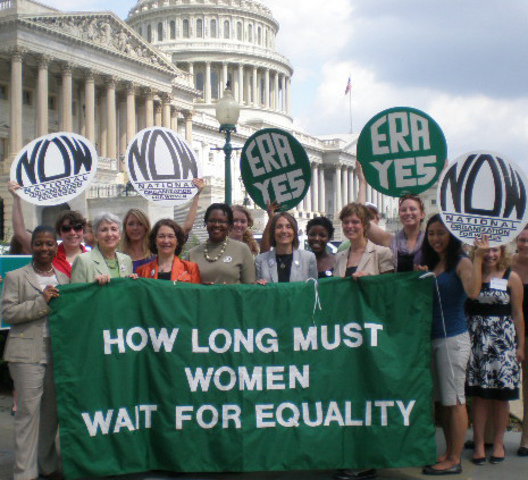
AA: Well, it sounds to me like you are fighting so many battles and you’re changing the world in so many different areas. And that brings the question to my mind: how do you do it? Where do you get your funding? Where do you get your human hours for the insane amount of work that that takes? For committees on what sounds like all different levels, probably from grassroots up to more macro level stuff. Who’s doing this work and how are they doing it?
CN: Well, I would tell you that NOW could not do the work we do without our grassroots activists and chapters. We are made up of grassroots activists and chapters. We have 38 state chapters and we have over 250 local chapters throughout the states. And without those chapters and grassroots activists, we would not be able to do this work. They are the body of NOW, and they really make sure that the message, the vision, the mission of NOW is getting carried out everywhere throughout the states. They make sure they’re representing the local politics, the state level politics, and the national politics. Our national office focuses on federal legislation, but our states make sure the federal legislation messages are getting out and that people are calling congressional members. But they also make sure that things that are impacting local people and family members are getting put out, and that they’re pushing for things to make their lives better for people around them that they love. So, nothing would get done without our supporters, our activists, and our members in the states who are leading the charge.
AA: That’s awesome. Is there anything else that you’d like to leave us with, Christian? This has been so, so interesting and inspiring. Do you have any last thoughts that you’d like to share?
CN: I would just tell everyone that if you are interested in being involved in what NOW is doing, and like I said, we have over 38 state chapters, but local chapters are where you really would be super, super involved. I encourage you to go to our website, www.now.org, and see if there’s a chapter near you where you can connect, or just see what we’re doing at the national level. We do have Virginia chapters, we have Maryland chapters, we have D.C. chapters, but we also have national events as well. And to see what’s happening with us and the events we put on, virtually as well, for anyone who might be interested and for our supporters. We also have a podcast that we started to make sure we’re getting our messages out, called Feminism NOW, to make sure we’re communicating what work we’re doing about advocacy and NOW’s mission and vision. And so that’s our way of communicating constantly what NOW’s about and the intersectional feminism that we’re trying to do. And keeping it truthful, talking about the good and the bad, but also making sure that we’re connecting with real people who are doing the real work. So I encourage everyone to stay connected to anyone, any organization that they feel connected to. We have a lot of work to do, so we need everybody.
AA: Wonderful. Well, that is so great and so inspiring. Listeners, check out the website. It’s so great to know about actual actionable items. Because sometimes we talk about the problems of the past and the historical foundations, and even the way that these phenomena are still manifesting themselves in our lives. And that’s a really, really important first step. But sometimes we’re left thinking, what can we actually do to change our communities? And in some cases, like you pointed out, even change the constitution. Sometimes laws still need to be changed. So, thank you for those action items. And listeners, check it out. Again, what an honor and such a joy to talk to you today, Christian. Thanks for being here.
CN: Thank you so much for having me on.
We have to continue to push and continue to encourage people
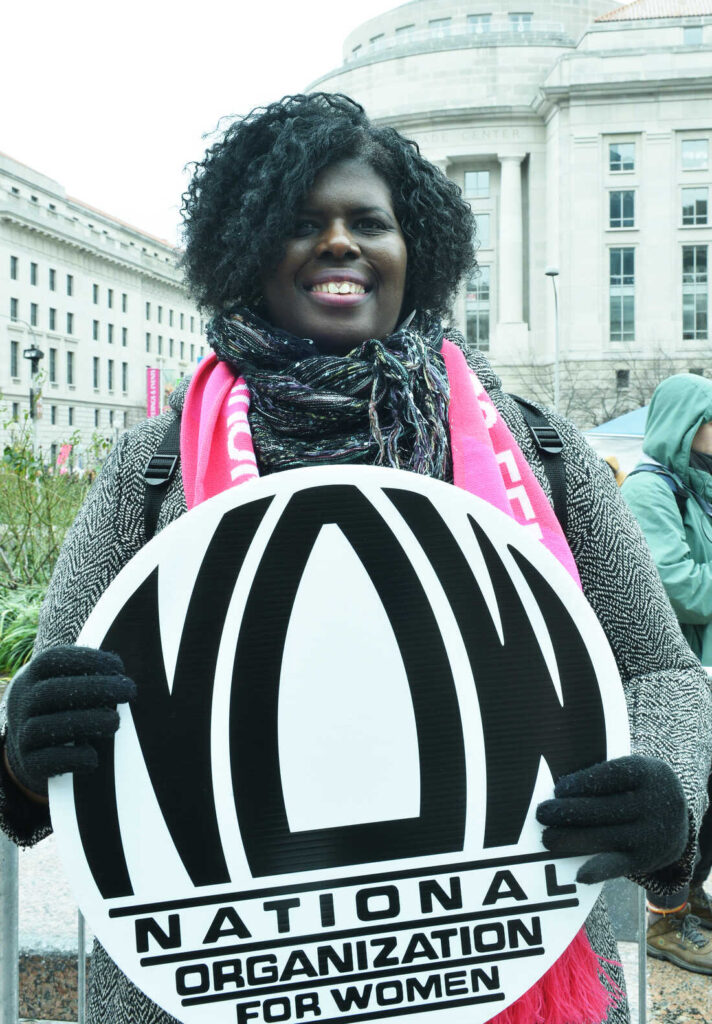
why it’s so important that women are protected.
Listen to the Episode
&
Share your Comments with us below!

